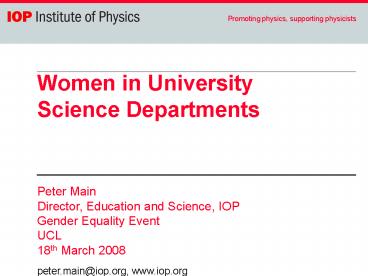IoPP onscreen PowerPoint slides - PowerPoint PPT Presentation
1 / 25
Title:
IoPP onscreen PowerPoint slides
Description:
Wrote to each department in the UK and Ireland (copied to the VC) ... Using good practice guides ( e.g. RCUK Research staff concordat) Department site visits ... – PowerPoint PPT presentation
Number of Views:55
Avg rating:3.0/5.0
Title: IoPP onscreen PowerPoint slides
1
Women in University Science Departments
Peter MainDirector, Education and Science, IOP
Gender Equality Event UCL18th March
2008 peter.main_at_iop.org, www.iop.org
2
Plan of Talk
- Diversity Programme
- Site Visit Scheme
- JUNO Code of Practice
- Working with other organisations
3
Diversity Programme
4
Diversity Programme
- 1.5 FTE staff
- Katharine Hollinshead Programme Leader
- Saher Ahmed Programme Coordinator
- Examples of Activities
- Career breaks guidance
- Women in university physics departments report
- Diversity in HE (with the RSC)
- Best practice guide on Disability
5
Physics nationally
6
Physics nationally
7
Physics nationally
8
Site Visit Scheme
9
Background
- Wrote to each department in the UK and Ireland
(copied to the VC) - Visits by invitation only and there was no charge
- Visited 17 (out of 46) physics departments in
all.
10
The Visit
- Paperwork (sent beforehand) included admissions
statistics, gender disaggregated student numbers,
pass rates, staff handbook etc. - Meeting with departmental management , admissions
tutor, director of teaching, HR representative
etc - Meetings with
- Female academic staff (where none, women staff
from cognate subjects) - Male academic staff
- Female RAs and PGs
- Male RAs and PGs
11
The Visit
- Lunch with female UGs. No staff were present
- Laboratory tour
- Informal feedback at the end from the chair of
the panel to the HoD - Confidential written report is sent to HoD with
recommendations.
12
Observations
- Women underrepresented in seminars and colloquia
- Most departments were not monitoring statistics
- Departments without women suffer in many ways (eg
admissions, role models). Male staff are usually
aware of this but are very reluctant to do
anything about it. - The fact that the visit took place meant that
gender issues were discussed, perhaps for the
first time. - Situation on the ground is often very different
from what management believe.
13
The Best Departments
- Sympathetic Head of Department (they were all
male). In some cases, it was clear that former
HoDs had been very biased. - Male participation in family-friendly policies.
If they did not, women felt they were perceived
as letting the side down by, for example,
taking maternity leave or fitting their hours
around the nursery. - A high fraction of young staff. Young fathers
appreciate the problems but younger men are
generally more sensitive to gender issues.
14
The Best Departments
- Women involved in senior management. But women
were often disinclined to get involved because
they found the prevailing attitudes so
unpleasant. - Strong, informal social networks for women. (In
some places found that men had unconsciously
created an uncomfortable atmosphere by being so
friendly among themselves).
15
Important Issues
- Formal, transparent procedures at all levels.
- Recruitment (no secret discussions, women on
interview panels) - Promotion (major issue)
- Appraisal (particularly for RAs)
- Workload allocation
- Women on serious committees
- Career breaks
16
Important Issues
- Even successful female RAs and PGs did not want
an academic career - Not consistent with starting a family
- Average age of academic appointment is 35.
- Effect of multiple short term contacts
- Lack of a well-defined career structure
- Lack of good careers advice
- Lack of role models
- Long hours culture
17
Important Issues
- Childcare facilities were usually thought to be
inadequate and, where they were good, did not
have enough places. The best matched their hours
to those of the university. - Harassment. Although almost every place had a
procedure for dealing with harassment, the panels
were told of several cases, almost none of which
had been dealt with in a satisfactory manner.
18
General Report
- General report highlighting the issues and
disseminating good practice has been published - Created a lot of interest amongst other learned
societies
19
JUNO Code of Practice
20
JUNO Code of Practice Principles
- A robust organisational framework to deliver
equality of opportunity and reward. - Appointment, promotion and selection processes
and procedures that encourage men and women to
apply for academic posts at all levels. - Departmental structures and systems which support
and encourage the career progression of all staff
and enable men and women to progress and continue
in their careers.
21
JUNO Code of Practice Principles
- A departmental organisation, structure,
management arrangements and culture that are
open, inclusive and transparent and encourage the
participation of all staff. - Flexible approaches and provisions that
encompass, the working day, the working year and
a working life in SET and enable individuals, at
all career and life stages, to maximise their
contribution to SET, their department and
institution.
22
Two levels of engagement
- Supporter
- Physics department endorsing the 5 principles
set out in the Code of Practice - Champion
- Physics departments confirmed as meeting the 5
principles set out in the Code of Practice - Launched June 14th 2007
23
Working with other organisations
24
SPIDER
- STEM Professional Institutions Diversity and
Equality Resources - Core members IOP, RSC, RAEng RCUK (sec)
- Four strands
- HE and research institutes
- Business private and public sector
- Professional bodies internal organisation
- Public engagement
25
SPIDER HE and Research Institutes
- Athena Partnership IOP, RSC and UKRC
- Promoting resources and activities
- Benchmarking and checklists
- Using good practice guides ( e.g. RCUK Research
staff concordat) - Department site visits
- ASSET Survey
- JUNO
- SWAN awards
- Enabling other professional societies to get
involved
26
Virtuous cycle
27
Promoting physics, supporting physicists





























